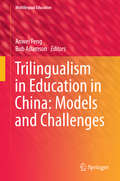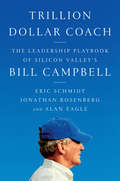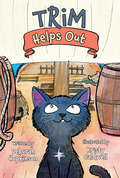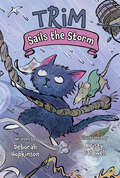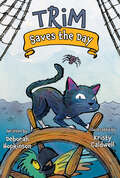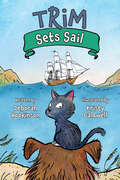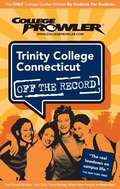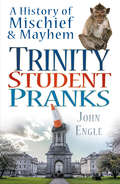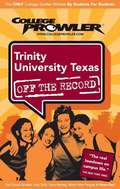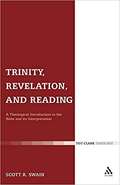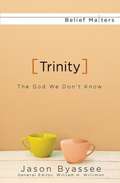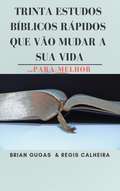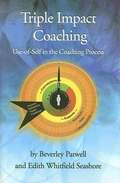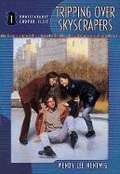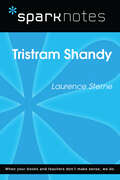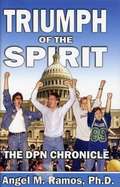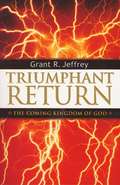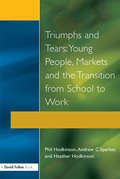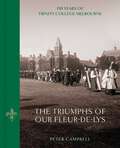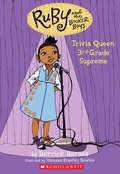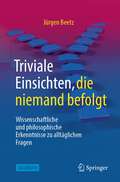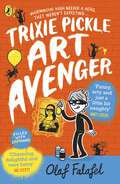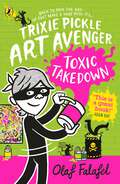- Table View
- List View
Trilingualism in Education in China: Models and Challenges
by Bob Adamson Anwei FengThis book examines language policies and practices in schools in regions of China populated by indigenous minority groups. It focuses on models of trilingual education, i. e. education in the home language, Putonghua (Mandarin Chinese, the national language), and English (the main foreign language). Special attention is given to the study of the vitality of the minority home language in each region and issues relating to and the effects of the teaching and learning of the minority home language on minority students' acquisition of Mandarin Chinese and English and on their school performance in general. The book also examines the case of Cantonese in Guangdong, where the local Chinese 'dialect' is strong but distant from the mainstream language, Putonghua. It takes a new approach to researching sociolinguistic phenomena, and presents a new methodology that emerged from studies of bi/trilingualism in European societies and was then tailored to the trilingual context in China. The methodology encompasses policy analysis and community language profiles, as well as school-based fieldwork, and provides rich data that facilitate multilevel analysis of policy-in-context.
Trillion Dollar Coach: The Leadership Playbook of Silicon Valley's Bill Campbell
by Jonathan Rosenberg Eric Schmidt Alan EagleThe team behind How Google Works returns with management lessons from legendary coach and business executive, Bill Campbell, whose mentoring of some of our most successful modern entrepreneurs has helped create well over a trillion dollars in market value.Bill Campbell played an instrumental role in the growth of several prominent companies, such as Google, Apple, and Intuit, fostering deep relationships with Silicon Valley visionaries, including Steve Jobs, Larry Page, and Eric Schmidt. In addition, this business genius mentored dozens of other important leaders on both coasts, from entrepreneurs to venture capitalists to educators to football players, leaving behind a legacy of growing companies, successful people, respect, friendship, and love after his death in 2016.Leaders at Google for over a decade, Eric Schmidt, Jonathan Rosenberg, and Alan Eagle experienced firsthand how the man fondly known as Coach Bill built trusting relationships, fostered personal growth—even in those at the pinnacle of their careers—inspired courage, and identified and resolved simmering tensions that inevitably arise in fast-moving environments. To honor their mentor and inspire and teach future generations, they have codified his wisdom in this essential guide.Based on interviews with over eighty people who knew and loved Bill Campbell, Trillion Dollar Coach explains the Coach’s principles and illustrates them with stories from the many great people and companies with which he worked. The result is a blueprint for forward-thinking business leaders and managers that will help them create higher performing and faster moving cultures, teams, and companies.
Trim Helps Out (Adventures of Trim)
by Deborah HopkinsonOne small kitten learns about the great big world as he sets sail with his fellow shipmates, animal and human, in this historical fiction intermediate reader.Trim is eager to do a good job on his first day as ship&’s cat—but what is his job? All around him, members of the crew are busy with their responsibilities—too busy to notice a small kitten looking for an opportunity to contribute. Jack the parrot directs Trim to the hold, to patrol for rats. But Jack neglects to tell Trim exactly what a rat is. Surely Princess Bea, the new friend he meets below deck, isn&’t a rat. She doesn&’t resemble the creepy, scary-looking creature that Jack warned Trim about and she&’s happy to have an assistant to fetch her biscuits from the galley.
Trim Sails the Storm
by Deborah HopkinsonOne small kitten learns about the great big world as he set sail with his fellow shipmates, animal and human, in this historical fiction intermediate reader.Trim has learned a lot about life at sea. He understands the daily routines and the responsibilities of each crew member, and he knows many of the ways to help. But one day he ventures outside and experiences something new and scary: a storm is brewing. As the wind whips his whiskers and the sky grows dark, Trim&’s heart beats like a drum. All his friends are doing new things: preparing the sails, closing any openings on deck, and securing loose items. Penny and Jack explain each step to Trim and he is comforted to learn all the ways to prepare for a storm. And then he hears a strange noise coming from the lifeboats. There he finds Wisdom, a young albatross who is also experiencing her first storm. Can these two small creatures help each other ride out a storm and make a frightening experience a little less scary?
Trim Saves the Day (Adventures of Trim)
by Deborah HopkinsonOne small kitten learns about the great big world as he sets sail with his fellow shipmates, animal and human, in this historical fiction intermediate reader.Trim like&’s being part of the ship&’s crew. The captain says that I&’s like a family or a team. Every has a jobs they do alone and they help each other too. And there&’s a big problem, then it&’s all hands on deck.But what is Trim&’s job? He really wants to help, but everyone is very busy. Penny is helping the sailors mop the deck, so Trim decides to mop too. Swish! Swish! SWISH! Trim gets water everywhere. Jack is helping the captain steer the ship, so Trim thinks he can steer too. Whee! Whee! WHEE! But there&’s not enough room on the wheel. Doesn&’t anyone have a job for a small kitten who really wants to help?
Trim Sets Sail (Adventures of Trim)
by Deborah HopkinsonOne small kitten learns about the great big world as he sets sail with his fellow shipmates, animal and human, in this historical fiction intermediate reader.When Trim trips over a napping dog, little does he know that soon he&’ll set sail and begin learning how to be a ship&’s cat. Among his first lessons: the parts of the ship (the front is called the bow, like &“bow wow&”), the dynamics among his new colleagues (Jack the ship&’s parrot is not so easy to befriend), and basic skills like climbing (up is easier than down) and swimming. With the assistance of Captain Flinders, Penny the ship&’s dog, and Will the ship&’s artist, Trim learns new skills, tests his limits and abilities, and finds a way to contribute to life onboard.This delightful early reader series by acclaimed author Deborah Hopkinson is inspired by the true story of Trim, often called the most famous ship&’s cat in history. Owned by British explorer Matthew Flinders, Trim traveled on the HMS Investigator on the first expedition to circumnavigate Australia (1801–1803).
Trinity College (College Prowler)
by Rachel Clark UnkovicNo university affiliations. No half-truths. No out-of-touch authors who haven't been in school for decades. A class project turned company, College Prowler produces guidebooks that are written by actual college students and cover the things students really want to know. Unlike other guides that jam everything into a five-pound book and devote only two pages to each college, our single-school guidebooks give students only the schools they want and all the information they need. From academics and diversity to nightlife and sports, we let the students tell it how it is. In addition to editorial reviews and grades for 20 different topics, more than 80 percent of each guide is composed of actual student reviews of their school. Whether readers are looking for "Best and Worst" lists, "Did You Knows?" or traditions, College Prowler guides have it all. Our books are the only place for local slang, urban legends, and tips on the best places to find a date, study, or grab a bite to eat.
Trinity College Library Dublin
by Peter FoxThis is the first comprehensive, scholarly history of Trinity College Library Dublin. It covers the whole 400 years of the Library's development, from its foundation by James Ussher in the seventeenth century to the electronic revolution of the twenty-first century. Particular attention is given to the buildings and to the politics involved in obtaining funding for them, as well as to the acquisition of the great treasures, such as the Book of Kells and the libraries of Ussher, Claudius Gilbert and Hendrik Fagel. An important aspect is the comprehensive coverage of legal deposit from the beginning of the nineteenth century, viewed for the first time from the Irish perspective. The book also draws parallels with the development of other libraries in Dublin and with those of the universities of Oxford and Cambridge, and features throughout the individuals who influenced the Library's development - librarians, politicians, readers, book collectors and book thieves.
Trinity Student Pranks: A History of Mischief and Mayhem
by John EngleTrinity College Dublin is famed for the intelligence and innovation of its students. However, not all the undergraduates have devoted their talents to academia; instead they spent their time devising ingenious and hilarious pranks to play on the unsuspecting dons.This fascinating volume recalls some of the greatest stunts, japes and practical jokes in the University’s history, including: a night-time escapade by the University Boat Club that plunged the town of Henley into darkness, the ‘buildering’ traditions of Trinity night climbers, the sticky-fingered activities of the Phil Society and its long-running rivalry with the Hist, and the exploits of future antiquarian and prince of mischief Andrew Bonar-Law. Also featured are some of the darker deeds of mischief that the earlier students were involved in, such as the Battle of Botany Bay and the pranks that went too far …This enthralling work will amaze and entertain in equal measure — and may well prove a source of inspiration for current students wishing to enliven their undergraduate days.
Trinity University (College Prowler)
by Kristin DicksonNo university affiliations. No half-truths. No out-of-touch authors who haven't been in school for decades. A class project turned company, College Prowler produces guidebooks that are written by actual college students and cover the things students really want to know. Unlike other guides that jam everything into a five-pound book and devote only two pages to each college, our single-school guidebooks give students only the schools they want and all the information they need. From academics and diversity to nightlife and sports, we let the students tell it how it is. In addition to editorial reviews and grades for 20 different topics, more than 80 percent of each guide is composed of actual student reviews of their school. Whether readers are looking for "Best and Worst" lists, "Did You Knows?" or traditions, College Prowler guides have it all. Our books are the only place for local slang, urban legends, and tips on the best places to find a date, study, or grab a bite to eat.
Trinity, Revelation, And Reading: A Theological Introduction To The Bible And Its Interpretation
by Scott R. SwainA theology of biblical interpretation, treating both topics in light of their relationship to the triune God and the economy of redemption.
Trinity: The God We Don't Know
by Jason ByasseeMost people assume they know what they mean when they use the word "God." They mean a powerful old guy in the sky ready to obliterate us if we do wrong but basically benevolent, if a little senile. The Christian doctrine of the Trinity shows us God is vastly more interesting. God is actually fleshed among us in Jesus, poured out on us in the Holy Spirit’s intoxication of the church. God is three divine persons in perfect harmony and beauty—and God invites us into that unimaginable intimacy. We don’t know this God, but we should. Trinity uses scripture, the Early Church tradition, and some modern theology to argue that God is a mystery whom we can’t understand but who can shape our misunderstanding to allow for faithful living and holy love of God and neighbor."JasonByassee thinks like a theologian, writes like a journalist, andcommunicates like a storyteller. We live in a time of trinitariandissonance, when the central doctrine of the Christian faith isstrangely neglected by most Christians. Byassee’s wonderful explorationof the Trinity offers a remedy for that by providing a meat-and-potatoesintroduction to the God who is at once Father, Son, and Holy Spirit. Anexcellent spiritual guide for both mature Christians and those brandnew to the Christian faith." —Rev. Dr. Andrew C. Thompson, AssistantProfessor of Historical Theology &Wesleyan Studies, MemphisTheological Seminary, Memphis, TN, and Wesley Scholar for the ArkansasConference of the United Methodist Church"Intrying to communicate the trinitarian relationship, Byassee succeeds inmaking the indescribable a little more coherent while reminding us ofthe all-consuming love of God. Trinity is a little book ofrigorous thought and deep devotion. It is rare these days to find a workof theology that stirs the intellect, the heart, and the spirit. And Ihave to admit, in reading this book, I fell in love with the Holy Spiritall over again." —Enuma Okoro, Nigerian-American writer, speaker, andaward-winning author of Reluctant Pilgrim, Silence, and Common Prayer: A Liturgy for Ordinary Radicals
Trinta Estudos Bíblicos Rápidos Que Vão Mudar a Sua Vida…Para Melhor
by Brian GugasA única maneira de realmente conhecer a Deus e saber o que ele espera de nós como filhos é lendo e estudando a Bíblia, através da oração, e através de adoranção e servinço junto com outros cristãos.É aí que este livro entra. Cada um dos trinta estudos bíblicos a seguir cobre uma questão que é relevante para a maioria das pessoas em algum ou outro grau. Cada um dos trinta estudos contém escritura, um exemplo bíblico do assunto, um exemplo mais moderno e sugestões para aplicar o que você leu à sua vida. A Bíblia é a Palavra de Deus. Deixe-o falar com você. Deixe mudar sua vida ... para melhor
Triple Impact Coaching: Use Of Self In The Coaching Process
by Beverley Patwell Evelyn J. Satterfield-JohnsonTriple Impact Coaching is a cascading or layered approach of coaching from you, the coach, to your clients, and from your clients to the people they work with resulting in benefits for the individual, team and organization. The coaching process begins with understanding your own Use of Self as a coach and learning how to be more intentional with your choices to obtain the impact that you need and desire. It is simple, profound and infinitely complex all at the same time. This book provides you with the Triple Impact Coaching model, concepts and tools. It also includes stories and examples from 3 companies who share their experiences with this unique coaching approach. Leaders, managers, change agents and teams are using Triple Impact Coaching as a support for traning and development, knowledge transfer, skill development and/or as a mechanism to help people lead and manage change
Tripping Over the Lunch Lady and Other School Stories
by Nancy Mercado"Tripping Over the Lunch Lady" by Angela Johnson, "How I got my English A" by Avi, "Experts, Incorporated" by Sarah Weeks, "Apple Blossoms" by Terry Trueman, "Science Friction" by David Lubar, "The Grade School Zone" by James Proimos, "The Desk" by Lee Wardlaw Jaffurs, "The Crush" by Rachel Vail, "The Girls' Room" by Susan Shreve, "Tied to Zelda" by David Rice.
Tripping over Skyscrapers (Unmistakably Cooper Ellis #1)
by Wendy Lee Nentwig"Book 1 of Unmistakably Cooper Ellis", a series for today's teens that carries them through the highs and lows of high school life in New York City.
Tristram Shandy (SparkNotes Literature Guide Series)
by SparkNotesTristram Shandy (SparkNotes Literature Guide) by Laurence Sterne Making the reading experience fun! Created by Harvard students for students everywhere, SparkNotes is a new breed of study guide: smarter, better, faster. Geared to what today's students need to know, SparkNotes provides: *Chapter-by-chapter analysis *Explanations of key themes, motifs, and symbols *A review quiz and essay topicsLively and accessible, these guides are perfect for late-night studying and writing papers
Triumph of the Spirit: The DPN Chronicle
by Angel M. RamosIn 1988 the world's only deaf liberal arts university, Gallaudet University in Washington, D.C. was ready for its next president. The Board of Trustees chose a hearing president who knew nothing about deafness. Unrest had been building on campus over this possibility, especially as there were highly qualified Deaf applicants. When the hearing person was selected and announced, the students exploded in protest. The next 7 days were covered by the national and international news media. What happened at Gallaudet had enormous worldwide impact. Since that protest, Deaf people have proudly advanced in all occupations. The DPN Movement has been likened to a civil rights movement for Deaf people. The author, Angel Ramos, PhD., was directly involved in the protest. Note: all spelling errors were in the print text.
Triumphant Return: The Coming Kingdom of God
by Grant R. JeffreyTriumphant Return is an upbeat, positive proclamation of the tremendous prophecies about the Second Coming and the awesome transformation of humanity that will unfold when Christ ushers in the Kingdom of God. Key Features Include:· Christ&’s Triumphant Return- your role in the coming Kingdom of God.· Why are the Rapture and the Second Coming under attack today?· How should we understand the Bible&’s prophecies: Literal or symbolic? Past or future?· The coming Millennial Kingdom of God- the key to understanding prophecy· Historical evidence disproves the false theory that Revelation&’s prophecies were fulfilled in A.D. 70· What did the Early Church believe about the Second Coming? The early Christians taught Christ&’s return will be literal, imminent, and premillennial. · Fascinating new research about the remarkable prophecies pointing to the nearness of Christ&’s premillennial return· Astonishing evidence the Muslim Koran acknowledges Israel&’s right to the Promised Land· How should the promise of Christ&’s return transform your faith and daily walk with God?
Triumphs and Tears: Young People, Markets, and the Transition from School to Work (Manchester Metropolitan University Education Ser.)
by Andrew C. Sparkes Phil Hodkinson Heather HodkinsonFirst Published in 1996. Routledge is an imprint of Taylor & Francis, an informa company.
Triumphs of Our Fleur-de-Lys: 150 Years of Trinity College Melbourne
by Peter CampbellTrinity College opened in 1872 as the first student residence associated with the University of Melbourne. Established by the Anglican Church, it provided supervised accommodation and academic support for undergraduate students. Over the years, this was expanded to include a theological school (1877), a women's hostel (1886, later called Janet Clarke Hall), and a foundation studies program (1990) for overseas students wishing to qualify for entry to Australian universities. Triumphs of Our Fleur de Lys provides a detailed historical account of the college's development and public contribution, set alongside the social, political and education changes in Australia over the past 150 years. It examines the contributions of numerous people to the college's progress, and covers the role of tertiary education institutions; the admission of women to universities; student social and sporting life, including music, drama and religion; developments in theological education; the provision of scholarships and pastoral care; standards of accommodation, food and discipline; and the fundraising undertaken in order to provide the transformative experiences envisioned by the college's founders and still found in its current mission. This history is published in commemoration of Trinity College's 150th anniversary, celebrated in 2022.
Trivia Queen, 3rd Grade Supreme (Ruby and the Booker Boys)
by Derrick BarnesIf you know anything about Ruby Booker, you know she's ready to make a name for herself. Well, her chance is coming up: in an animal trivia contest. But she'll need help. And when you're Ruby, help is Marcellus, Roosevelt, and Tyner: the most popular boys on Chill Brook Avenue -- and the brothers you've been trying to break away from.
Triviale Einsichten, die niemand befolgt: Wissenschaftliche und philosophische Erkenntnisse zu alltäglichen Fragen
by Jürgen BeetzWarum ist ein „Wirtschaftsweiser“ für Mindestlöhne und ein anderer dagegen? Wieso verfangen wir uns in ergebnislosen Diskussionen oder albernen Paradoxien, fallen auf die „Spielchen“ unserer Mitmenschen herein, verkennen Ursache und Wirkung, verwechseln Zufall und Vorbestimmung? Weshalb denken wir so und handeln anders? Sagen wir, was wir meinen oder meinen wir viel mehr oder etwas ganz anderes, als wir sagen? Wieso entstehen neue Systeme mit meist unerwarteten Eigenschaften „von selbst“? Wie entsteht eine neue Qualität durch eine veränderte Quantität? Dieses Buch zeigt, dass Philosophie, die „Liebe zur Weisheit“, auch im Alltag viele Probleme lösen und Handlungsanweisungen liefern kann. Dabei sind es oft „triviale Einsichten“, die uns einen Schritt voran bringen: Erkenntnisse, die wir schon längst haben oder durch ein wenig Nachdenken erlangen könnten, die wir aber einfach nicht beherzigen – aus vielfältigen Gründen, die hier ausführlich untersucht werden, mit dem Ziel, sie zu überwinden. Hier gehen Hirnforschung, Naturwissenschaften, Psychologie und Philosophie nebst einer Prise (Selbst-)Ironie eine interessante und amüsante Verbindung ein. Uns begegnen auf dieser Exkursion Paradoxien, die menschliche Evolution, zyklische Prozesse und seltsame Schleifen, Wahrnehmungstäuschungen, vernetzte Systeme und Regelkreise – schließlich das Chaos und die „objektive“ Wahrheit. Die Leser lernen, Querverbindungen und Zusammenhänge zu erkennen, die sie bisher nicht gesehen haben. Einfache Erkenntnisse werden erneut ins Gedächtnis gerufen. Wir entdecken offensichtliche Vorteile beim Gebrauch des Verstandes und vermeiden die kleinen aber tückischen Fallen des Alltags: fruchtlose Schwarz-/Weiß-Diskussionen, verborgene Zwickmühlen innerer Widersprüche, kostspieligen Aberglauben oder schädliche Psycho-Spiele. Also lautet die Devise: „Benutze deinen Verstand!“
Trixie Pickle Art Avenger (Trixie Pickle Art Avenger #1)
by Olaf Falafel'Funny, arty and just a little bit naughty, the Art Avenger is amazing!' Matt Lucas'Very funny . . . I learned tons about art and laughed A LOT.' Joe LycettA laugh-out-loud illustrated adventure featuring Trixie Pickle, the Banksy of her school.Trixie loves art and hates bullies - and so decides to become an Art Avenger, righting wrongs at her school through art.She uses Picasso, Pollock and Ofili to teach bullies a lesson, get out of lessons and help those in need, like an arty Robin Hood. Highly illustrated throughout by Olaf and with fact files of hilarious and irreverent details about real artists, Trixie Pickle is perfect for fans of Konnie Huq, Sam Copeland and Liz Pichon.
Trixie Pickle Art Avenger: Toxic Takedown (Trixie Pickle Art Avenger #2)
by Olaf Falafel'This is a GREAT book! Funny, charming, original, secretly educational.' Adam Kay'Funny, arty and just a little bit naughty, the Art Avenger is amazing!' Matt Lucas'Very funny . . . I learned tons about art and laughed A LOT' Joe LycettA laugh-out-loud illustrated adventure featuring Trixie Pickle, the Banksy of her school.A weird sickness bug has been spreading through Wormwood Town and everyone is wondering if there's something in the water. Trixie Pickle Art Avenger uses the power of art to investigate - can she get to the bottom of the mystery around the town reservoir?She's got a lot on her plate - being bored to sleep by Money Week at school, making comics with her best friend Beeks and finding a way to bring down the local mean girls - but with artistic inspiration from Botticelli, Damien Hirst and Kehinde Wiley, the Art Avenger is sure to win the day.Highly illustrated throughout by Olaf and with fact files of hilarious and irreverent details about real artists such as Yayoi Kusama and Hokusai, Trixie Pickle is perfect for fans of Konnie Huq, Sam Copeland and Liz Pichon.
